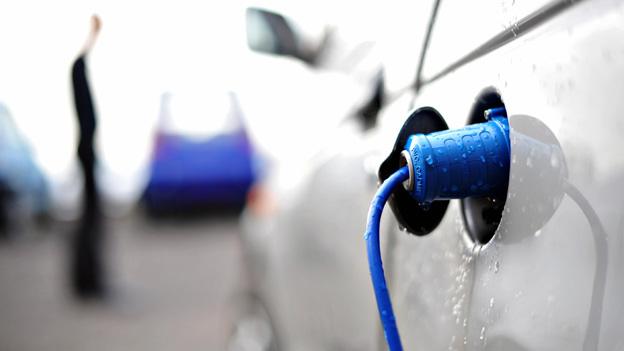Electric car charge point use doubles
- Published

The use of electric car charging points across Scotland has more than doubled in the last year.
Chargers were used 26,119 times during August, up from 12,939 in August 2015 and nine times the usage in August 2014, ChargePlace Scotland said.
Electric vehicle drivers appeared to favour rapid charge points, with many standard charge points not used at all.
Recent figures showed there were 3,575 electric vehicles licensed in Scotland, up from 2,050 the previous year.
There are 870 public and commercial charging points in the ChargePlace Scotland network with a total of 1,772 connectors or sockets between them, up from 694 charge points and 1,373 sockets a year earlier.
According to ChargePlace Scotland, the majority of public charge points will fully charge most electric vehicles in between four and eight hours.
Rapid chargers - which make up 18% of the charging total - can charge cars up to 80% in half-an-hour.
Usage rates
Despite the overall increase in usage, a quarter of charging points around the country were not used at all during August.
Of 76 charge points in Glasgow, 68 were used in August, while of 68 in Edinburgh only 46 were used at least once during the month.
The lowest usage was in Dumfries and Galloway where just eight of 20 charging points were used.
The figures were revealed as part of RAC Foundation analysis of data collected from the ChargePlace Scotland network. The data does not include domestic charge points.
Steve Gooding, director of the RAC Foundation, said: "They say that when it comes to buying a house, location, location, location is everything.
"So it goes with electric charge points. Facilities need to be in places where people will use them.
"But there's something more. The evidence suggests that it is rapid chargers that are getting a disproportionate amount of use, which bears out the view that improving the convenience and speed of 'filling' up with electricity is mission critical to the wider take-up of these vehicles."
WWF Scotland director Lang Banks said: "Independent analysis has shown that for Scotland to meet its future climate change targets, one in three cars, and half of all buses, will need to be electric by 2030, in line with the long-term need to phase out fossil-fuel vehicles entirely.
"The Scottish government's forthcoming energy strategy and climate action plans provide the ideal opportunities to bring forward the policies needed to deliver such a transformation."